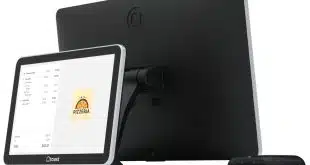Clover Network Inc., which on Wednesday burst into a crowded market for tablet-based point-of-sale systems, is betting that merchants would like to choose their apps for customer service and checkout in the same way they can load apps on their smart phones.
With the new Clover Station, merchants can download new apps from an array of programs offered by outside developers coding for Clover’s app marketplace. These might include apps, for example, for functions ranging from order-ahead to inventory control. The Station includes a purpose-built tablet with built-in card swipe and attached receipt printer and cash drawer. “Our goal is to replace everything on the countertop of a brick-and-mortar merchant and give them one simple solution,” Leonard Speiser, cofounder and president of the Mountain View, Calif.-based startup, tells Digital Transactions News.
For the time being, Clover’s Android-based system will be sold by Bank of America Merchant Services, a merchant-acquiring alliance formed by Bank of America Corp. and processing giant First Data Corp., which bought Clover last year and will handle back-end processing. Other resellers will be added over time, Speiser says. Shipments are expected to start before the end of the year.
Speiser says pricing to the merchant will be determined by its resellers, though he aims to keep Clover Station competitive with cash register and terminal combinations. Pricing will also likely come in at about half the cost a merchant would confront if sourcing a tablet and other components separately, he says.
Clover arrives in a marketplace already teeming with players trying to get small retailers and restaurants to replace existing POS systems with tablet-based gear. Competitors include Square Inc., NCR Corp., and PayPal Inc., which is working with tablet POS providers like ShopKeep POS to offer free processing for a limited time if the merchant ditches its cash register.
“We welcome others to join in the revolution as the mobile tablet continues to replace traditional PC-based POS systems and cash registers,” said New York City-based ShopKeep’s founder and chief executive, Jason Richelson, in commenting by email on Clover. “A fully open model is the right way to go.” ShopKeep says it has signed up nearly 8,000 merchants since its first iPad app became available two years ago.
But Clover appears to offer some advantages, experts say. One is its open application programming interface (API) and developer community, which together allow merchants to replace built-in apps with better ones if they like. Another is a clear focus on hardware aesthetics and function. Clover wants its system to look attractive on a countertop and be convenient for customers as well as cashiers, Speiser says. The Station includes a stand that allows the touchscreen tablet to swivel to the customer to sign receipts, for example. Clover also claims its Station is intuitive enough that a merchant can set it up and have it running within 15 minutes
“It’s pretty cool and good-looking,” notes James Wester, research director for payments at IDC, a Framingham, Mass.-based research firm . “It’s interesting in a space that’s becoming less interesting because it’s so crowded.”
But other Clover features may not be so distinctive. Its cloud connections, for example, allow multiple tablets to access the same data but are available from competing providers. And some have also created marketplaces offering access to at least generally available apps. San Francisco-based Revel Systems Inc., for example, a year ago launched iPad Marketplace for POS System Plug-ins, which Revel says allows easy integration with third-party apps like Facebook and Groupon.
Still, Clover’s backing by First Data and its link to a major acquirer like BAMS will give it a leg up in reaching and selling to both new and existing merchants. First Data brings processing advantages, as well. For example, it is offering encryption that masks card data from the card swipe until the transaction reaches its data center. “This is a strategic investment [by First Data],” says Wester. “This is the way First Data is moving when it comes to POS terminals.”





